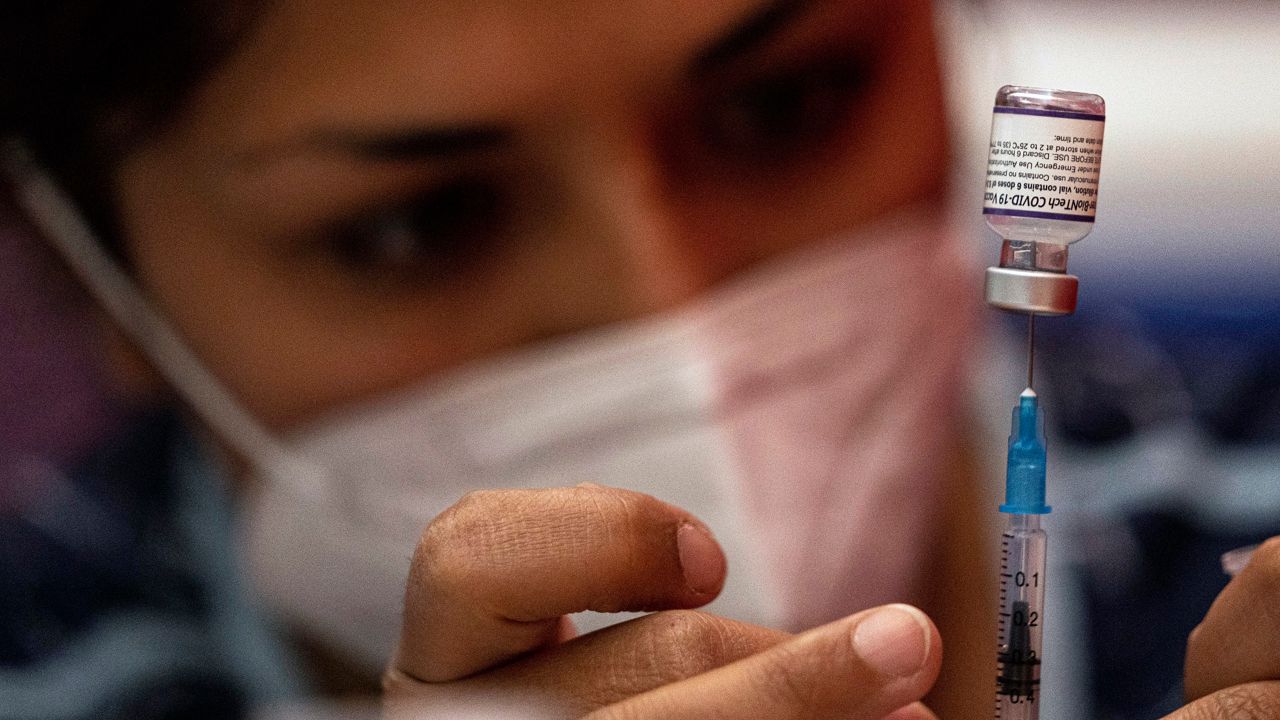Some people may now wait up until eight weeks between their first and second doses of COVID-19 vaccines, according to updated guidance from the Centers for Disease Control and Prevention.
What You Need To Know
- Some people may now wait up until eight weeks between their first and second doses of COVID-19 vaccines, according to updated CDC guidance
- The CDC made the change, in part, with the goal of mitigating the rate of rare heart inflammation cases associated with the Pfizer and Moderna shots
- The CDC said an eight-week interval may be optimal for males 12 to 39 years old, a group at higher risk of developing myocarditis
- The agency continues to recommend the three- and four-week intervals for those who are immunocompromised, 65 years of age or older, or in need rapid protection due to increased concern about community transmission or risk of severe disease
The CDC made the change, in part, with the goal of mitigating the rate of rare heart inflammation cases associated with the Pfizer and Moderna shots.
Previously, the agency recommended people receive their second Pfizer shot three weeks after the first, and their second Moderna shot four weeks later. But the CDC modified its guidance Tuesday to recommend an interval of three to eight weeks between Pfizer doses and four to eight weeks for Moderna shots.
The CDC said an eight-week interval may be optimal for males 12 to 39 years old.
“While absolute risk remains small, the relative risk for myocarditis is higher for males ages 12-39 years, and this risk might be reduced by extending the interval between the first and second dose,” the guidance says.
The agency continues to recommend the three- and four-week intervals for those who are immunocompromised, 65 years of age or older, or in need rapid protection due to increased concern about community transmission or risk of severe disease.
The CDC stresses, however, that the vaccines are safe and effective and approved by the FDA for the shorter intervals.
U.S. health officials hinted earlier this month the change in guidance was likely. In a Feb. 4 presentation to the CDC’s Advisory Committee on Immunization Practices, a panel of outside advisers, Dr. Sara Oliver, citing data from other countries, said an extended interval between doses appears to reduce the risk of myocarditis. Researchers in England also have found that antibody levels were higher in people who waited longer between shots than those who were vaccinated according to the standard schedule.
Extending the time between shots beyond eight weeks has not been shown to provide any additional benefit, the CDC said.
Last summer, the FDA added a warning to Pfizer’s and Moderna’s vaccines about mild, rare cases of heart inflammation seen in some teens and young adults following vaccinations, primarily after the second dose.
The risk of myocarditis may be higher with the Moderna vaccine than with Pfizer’s, the CDC said.
The FDA has granted full approval of the Pfizer vaccine for people 16 and older and of the Moderna vaccine for 18 and up. The FDA has given emergency use authorization to the Pfizer shots for 5 to 15 years old, determining the benefits outweigh the risks.
COVID-19 itself also can cause myocarditis, health experts say.
According to CDC data, more than 253 million Americans — 76% of the population — have received at least one vaccine dose, while 215 million — or 65% — are fully vaccinated.
The CDC continues to recommend that most people receive a booster shot five months after their second Pfizer or Moderna dose, or two months after the single-dose Johnson & Johnson vaccine.
Among persons with an extended interval, there were higher antibody and B cell responses, as well as sustained B and T cell responses, compared to a standard interval.
Neutralizing antibody titers were higher following an extended dosing interval with mRNA vaccine, compared to a standard interval.



